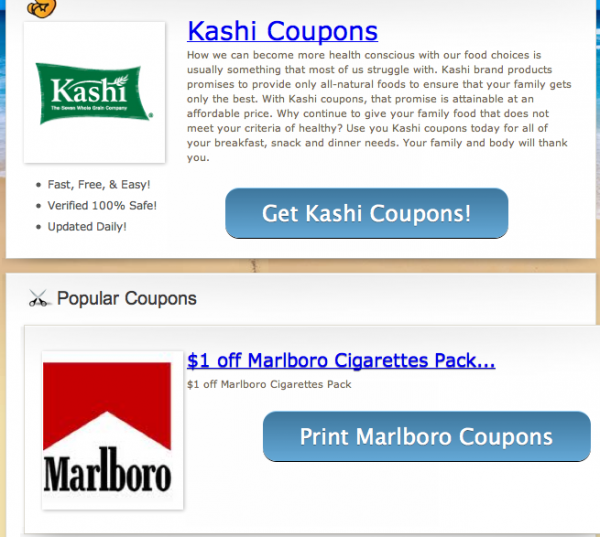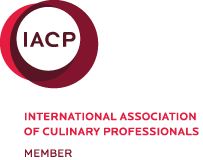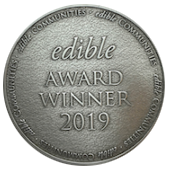After reading yet another blog post extolling the virtues of couponing, I’m moved to present a contrarian point of view.
To begin, I’ll share several factors in my life that drive my perspective on food marketing, grocery shopping and couponing—and I’ll own the fact that my situation may not be like yours.
- Eating and living in a healthful way is a top priority for Rob and me.
- We live in an urban area with access to one of the country’s finest public markets, a source for fresh and reasonably priced food. Cincinnati’s Findlay Market is where we shop every Saturday for nearly all our produce, meat, dairy and baked goods.
- We don’t have children, so no voracious appetites or picky eaters to satisfy.
- We like to cook.
That said, I’m often dismayed when I open our Sunday paper and see the proclamation of $150-something in coupon savings. Why? Because manufacturers use these discounts to push foods that are less healthy and to encourage overconsumption. Let me explain:
Coupons promote foods that are less healthy. Sugary cereals. Pizza rolls. Frozen entrees. Dinners-in-a-box. Pay attention to the food coupons in your Sunday paper: How many discounts do you see on fresh (not canned, or in syrup) fruit or unprocessed food?
Coupons encourage overconsumption. Buy one, get two free sounds like a good deal on the surface. But I’m pretty sure I need only one box of Pop-Tarts (and, if I’m completely honest with myself, I don’t really need the one). Four boxes of hamburger dinner. Ten cups of sweetened yogurt.
Coupons encourage overacquisition. I’m sort of horrified by those “extreme” couponing shows on cable TV, where people crow about their basement stash of 5 years’ worth of canned soup and toothpaste. Where I come from, we call that hoarding. Just because it’s “free,” doesn’t mean you need it.
Coupons push Big Food’s agenda. As a writer and advocate whose goal is to encourage simple, healthy eating, I shudder to see foods touted for their “health” properties. Dairy products with added fiber. Sugar substitutes with vitamins. Whole-grain breads loaded with HFCS. Crackers with antioxidants. Ever notice how many coupons for antacids and stomach-soothing meds there are in the Sunday paper? Maybe we should just be eating a little better …
Because of where and how we shop, I rarely clip coupons. Mostly, I look for savings on personal care and home care products, and on a few staple food items like non-sugar cereals or canned tomatoes. Would I like to reduce our grocery bill? You bet. Am I pissed that there aren’t coupons for healthy choices? Absolutely. Do I think those people with five years’ worth of canned soup and toothpaste in the basement are nuts? Yep.
I’m not at all averse to clipping coupons in a general sense—like everything related to eating, I would simply advocate mindfulness. Here’s the thing: It’s completely possible to eat well and save money. (Here’s just one article on how to eat healthy on a budget.) It comes down to cooking, simply and with real ingredients. Which is why I’m here, and I hope why you are, too.
related recipes (no coupons required)
easy chickpea and tomato stir-fry
delicious cooking with whole grains
pasta with zucchini, pine nuts and parmesan
best sautéed vegetables
roasted seasonal vegetables
Now, I’m not trying to be a coupon curmudgeon, so please share your thoughts on the topic in the Comments below.
Edit: So, this morning I revisited this post and decided to try a web search for coupons for a healthful product that I know I would use: Kashi crackers or cereals. Here’s the very first link I clicked … sigh.






I’ve cut coupons religiously for 15 years, but I’m finding that I use less and less as I’ve switched to a more fresh/organic diet. I do use them on household products and use them to stock up on things like tampons, swiffer refills, toothbrushes, Earth’s Best toddler snacks, etc. when I both have a coupon and they’re on sale. And at places like Target, you can “stack” coupons when you have both a store and manufacturer coupon. Also, Kroger sends me coupons for stuff I’ve bought in the past, so I’m getting more and more coupons in the mail for natural foods items, Seventh Generation stuff, organic meat and produce—and baby stuff, although I’m buying less and less of that now. Still, I totally see your point, and you’re right—most of the coupons are for unhealthy convenience foods. If I were you, I wouldn’t bother with them. But I think you can still make good use of them and eat healthfully if you don’t let them drive your purchasing decisions.
Bryn,
I completely agree. And will add that discounting puts additional financial pressure on the incredible people who have small businesses and are producing healthy food in our local economies.
B
Sarah, thanks for the comment. You’re right: I’ve overlooked store loyalty programs like the Kroger Plus card that send you coupons for stuff the retailers know you buy, which is a real benefit. And I agree with you on using coupons to save on things like deodorant and detergent and other personal/home items. As I was researching this post yesterday, I checked in on some coupon websites and, of the food items I found, I’d say 75% of the offers were for processed foods or two-for-ones on snack foods, refrigerated cookie dough, and the like. I suppose my conclusion is — if you’re going to use coupons, which I don’t disagree with at all — use them, as you are, with intent and not to buy a bunch of stuff you don’t need. Thanks for sharing your experience!
Kashi and Marlboro? Really!?!?! You’re right: Most of the coupons online and in the paper are for processed junk food that would be cheap and easy to buy (especially with the coupons). That’s why I’ve come to rely more on the targeted coupons you mentioned above. And as I gave it some more thought, I realized that almost all of the coupons I clip from the paper now are for non-food items, with the exception of the ones from Kashi, Boca, Morningstar Farms, Newman’s Own, etc. Good topic!
I have to admit that coupons got me through college. Everything was cheap and shelf stable at a time where the nearest supermarket was miles away and across a major highway. Now I can’t tell you the last time I used a coupon for food. I’ll still stumble across one every so often for a cleaning product or aluminum foil, but that’s pretty much the only thing I ever use them for. I just don’t use the stuff that they sell with coupons.
Hi there! New to your site and love your writing! I used to be a total coupon-lover, which was the only reason we get the Sunday paper. I still get excited every week as I scan through all the discounts but I’ve noticed that I’m clipping less and less of the coupons. In fact, the last month, I’ve found almost none that I would use. There are a few coupons for healthy food especially during the new year when everyone’s on a diet but I also believe that the best way to eat healthfully (and on the cheap!) is to cook the meals yourself. That way you know exactly what’s going into your body and if you don’t cook more than you need then you don’t overeat either! I’m sure there are many people out there that simply don’t have to time to cook with their busy schedules and hungry families but it works for me and it looks like it works for you too!
Hi, Cookie — thanks for finding writes4food.com, and for commenting on the post! I agree with your comment that not everyone has the time or the interest or the resources to cook from scratch. But for me, too, cooking simple ingredients does add up to better health. Welcome!
You really have to be open to all of it – the links that you mention are just someone indiscriminately catering to people who want a specialty type of coupon. Im a diabetic and an extreme couponer – I go for the kashi coupons, love that you can play a few games on recyclebank.com and get a $2 kashi coupon to print twice – love the cereal deals in stores and the occasional free milk with kelloggs – when that happens and it includes bran, I go up to the store max and freeze the milk. I also have gotten great deals by combining the store sales with high value coupons for soy milk.
Frozen veges if they are not doused in toxic sauce, can be a real find with extreme couponing techniques. Half price + manufacturer coupon + store coupon + catalina off the total order – boom, swish, done, freezer stocked, next.
Muir Glen organic tomatoes – if you are not averse to metal canned products, you can print coupons for those and stock up on tomato paste at walmart for practically nothing. Or you can buy their jarred stuff at a serious discount.
Rice – again, there are coupons for more than just the quick junk – I have done very well with mahatma coupons at walmart. Wait for the rollback, buy the smallest size, stock up, pounce.
There are rare coupons for produce – but they do exist – or catalinas for anything in the store. Sometimes I will buy what I do not use because the store pays me to take it away – and that overage goes toward the fruits and veges I really want. There are umpteen food pantries in town that are happy to take it. Usually for me this is not junk, but a brand I may be allergic to, or just not like. You can do a lot of this sort of thing with bottled sauces. I dont need the salt, but a lot of barbecue guys here just love this stuff mixed with their own concoctions. Barbecue is part of the food culture here.
If you are going to really score with coupons, you cannot be brand loyal. The attitude is not just for savings, but for profit. And that profit goes toward your healthy eating.
When you combine a coupon with doubling and stack with a store coupon and sale, and it results in free product plus overage, you just moved the product and made the store happy and didnt pay a dime toward big food. And you got what you wanted. And they paid for it.
Thats my attitude! Like yours too!
Thanks for this comment! I was hoping to get a good perspective from someone who really works the coupon system to great advantage and still manages to come home with healthy things in the grocery bag. I appreciate your input to the conversation!
Nice that you thought of the Kashi, but I deplore anything that might tempt anyone to purchase even Marlboro cigarettes. I have pretty much given up even looking at the coupon advertising inserts in the newspaper as they lead people to buy things they don’t need. This comment is in response to an otherwise interesting feature story at writes4food.com
This post reminds me of a recent Facebook exchange I saw. A single mother of 3 proudly shared that, due to couponing, she was able to purchase a bunch of frozen meals for a very low price. Someone responded, trying to be helpful, that she should keep an eye on the sodium levels in what she purchased. The mother replied defensively that she was just trying to provide for her family on a meager food budget.
I am also struggling with how to learn to feed my family better food but stick to a budget. I totally agree with you that couponing is not the only answer. I will never buy toothpaste w/out a coupon but I don’t want 17 boxes of frozen pizza rolls even if they are only $3.00. I’m still trying to figure out what the answer is for my family but thankfully there is a lot more focus these days on the topic of how to purchase and cook better food.
I completely relate to your post about Coupons. My husband and I try very hard not to buy pre-made, frozen, canned, or boxed anything. Not only is it much more expensive than fresh foods, its usually terrible for you. I’ve learned that the time it takes me to find and clip coupons and then remember to use them is a waste. We don’t have any children either, but I don’t think that is an excuse to buy that kind of food. Teaching children to eat healthy and to know where their food comes from should be a top priority as a parent. How else will we change the way this country eats?
I’m so glad someone has written about this. When you watch these crazed people on TV (obviously the extreme personalities being the ones televised), I can’t help but think, “And why, exactly, do you need 40 2-liters of Pepsi?” Personally, I have found that coupons are great for non-food products: Swiffers, cleaning supplies, toilet paper, etc, but what I would really like coupons for would be fresh fruit and vegetables, non-processed breads, milk, etc. All of these coupons are for unhealthy, processed foods and I hate to think of these parents who are “saving” money and feeding only processed, boxed foods to their kids. I’d like to think there can be a mix of using you coupons and using your head, but I don’t know that that is always the case. Come on, America, wake up!
Halle — thanks for the comment. I completely agree with your notion of balancing the use of your scissors and your head when it comes to clipping coupons.
Great article. And most people don’t realize that when you start eating fresh and homemade food, the grocery bill is actually cheaper than buying junk. Plus, you’ll save money in the long run by having lower health care costs.
And as far as cleaning products go, it’s cheaper to just use vinegar and baking soda for most of the cleaning, and it’s safer, too.
This might have been meant as a throw-away line: “Ever notice how many coupons for antacids and stomach-soothing meds there are in the Sunday paper? Maybe we should just be eating a little better …” but I felt the need to comment about it.
Poor food choices may not be the only reason people need to use these products. You could have unknowingly gotten a bad piece of fish, for example, that led to stomach issues after consumption. Or, other factors could come into play. I almost never used to have any stomach complaints, until I started a new medication — now I have to take an antacid tablet almost every day, no matter what I eat. This medicine has literally brought me back to health, so I will deal with the side effects.
My point is that blanket statements like the above don’t necessarily help drive the conversation further. More thought should go into posts like this.
Hi, Sharon — thanks so much for commenting. You’re right: That line was rather glib, and I didn’t intend it to be so. Certainly, over-the-counter meds like this have huge benefit for people who need them, as you note. My point, really, was more an ironic observation about remedies for ailments caused, in part, because of our diet choices that are offered alongside some of those food items. In other words, if frozen, deep-fried jalapeno poppers (a regular player in my coupon section, especially at this time of year) give me tummy troubles, perhaps the answer is to not eat them, rather than taking antacids.
Thanks for pointing out the coarseness of my wording — I apologize that it reads that way.
Thank you for your thoughtful response, Bryn. As a fellow writer, I can get rather picky about word choice.
I am glad to see this. My wife and I eat a lot of organic meats, vegetables and fruits. Traditionally purchase a lot of our stuff at Whole Foods or Kroger (thankfully has started into the organics and considerably less). We will have to try Findlay Market and see if we can get anything cheaper there.
It all comes down to priorities. Some folks do not care what they put in their bodies, others are willing to spend more to be healthy. It just depends on where your priorities are. Mine are not necessarily better than the lady with all the pop, pizza and microwaveable meals. She spends less, I eat better. Cooking our meals is a priority. We pack our lunches knowing we will not eat dinner until late. We try to prepare a lot of stuff the night prior for more time intensive meals and keep most of them to 30 minutes or less of prep time.
I am as thrifty as the next guy and live on a budget, but I will spend more to make sure I am eating healthy foods.
Hi, JJ — thanks for the comment! I agree: it’s a matter of priorities, and they are what they are.
Pingback: Your top recipes of 2012. | writes4food | recipes and wisdom from a Midwestern kitchen